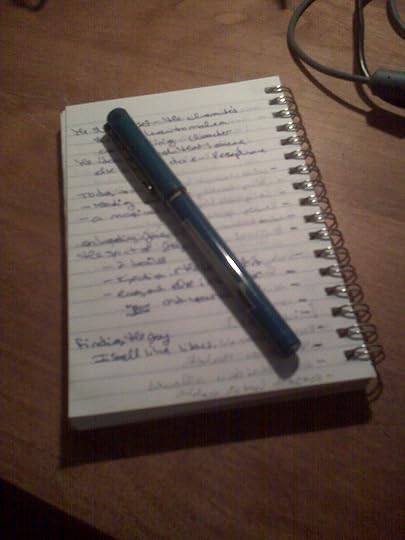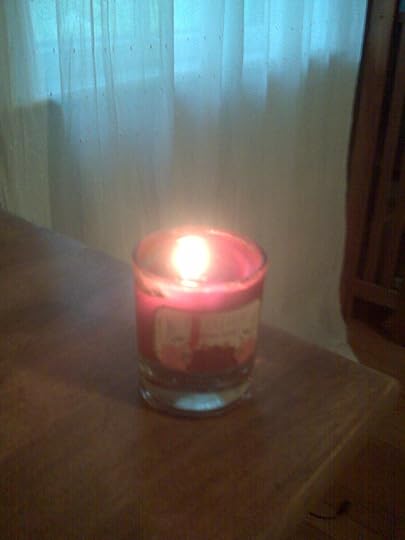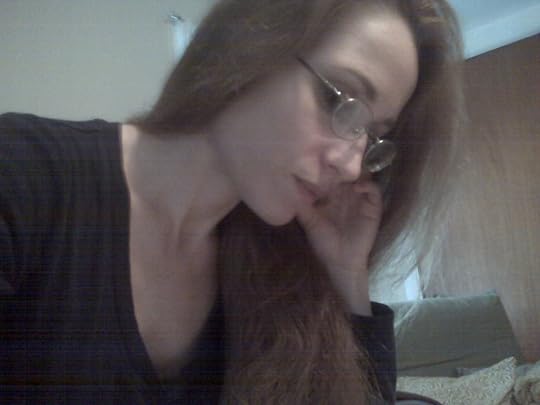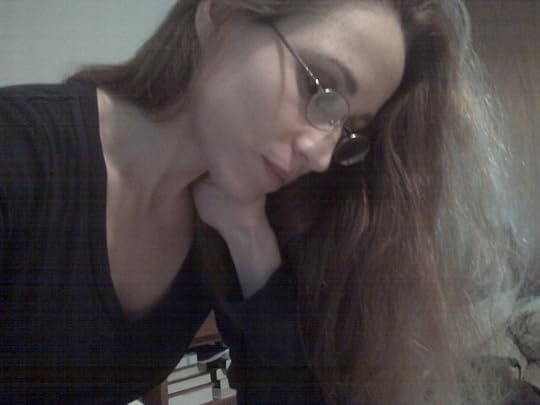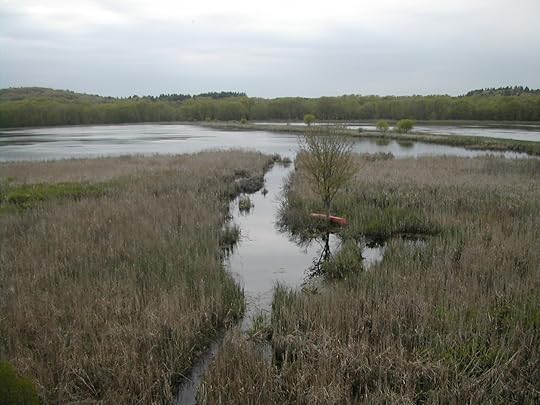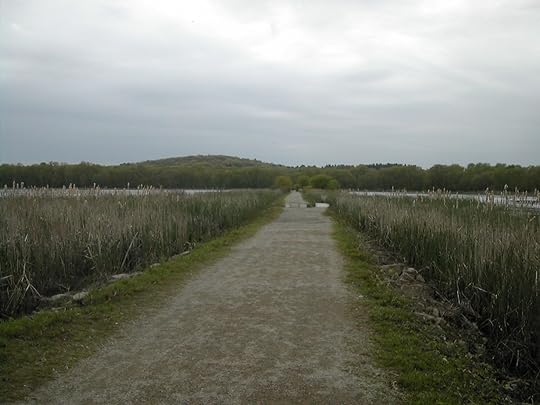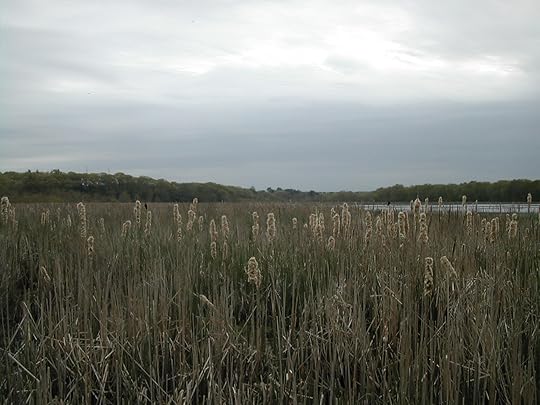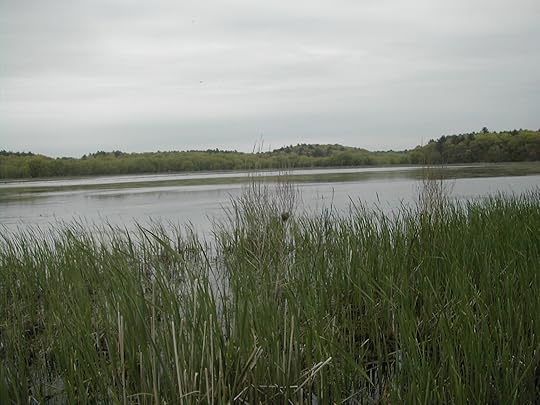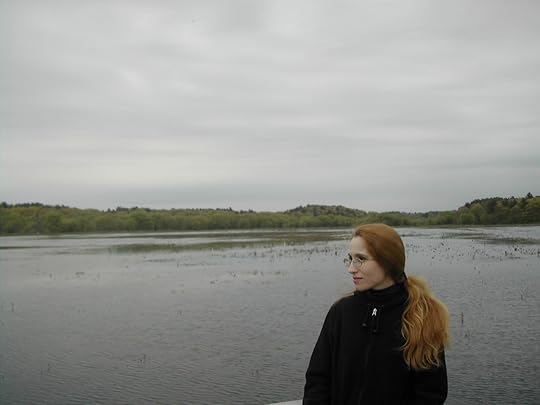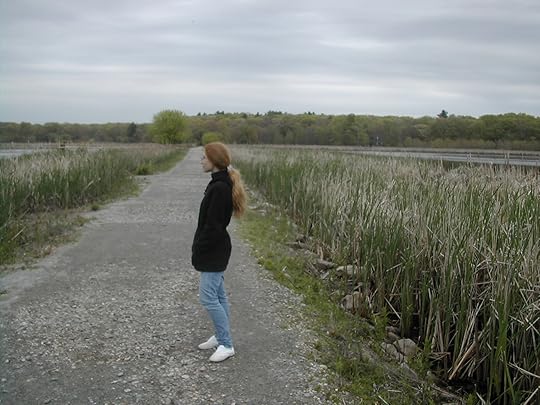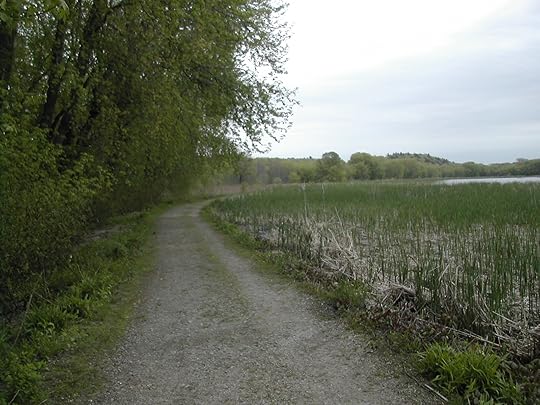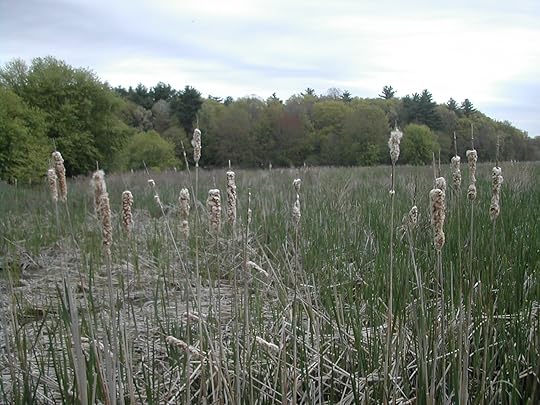Theodora Goss's Blog, page 59
May 17, 2011
Finding the Joy
I smell like lilacs.
The reason I smell like lilacs is that, as you may know, I've been trying out new perfumes. At first I thought the right one for me might be one of the classic perfumes, a Chanel or Dior, for example. But you know, they smell too complicated, too – honestly, too old. They don't smell modern to me. What I want is something clean, fresh.
Today I discovered that the company that makes my favorite candles, Pacifica, also makes perfumes. So I tried the French Lilac, and you know, it actually smells like lilacs? Which most lilac perfumes don't. But the scent took me back to walking among the lilacs at the Arnold Arboretum. I hope I can find time to visit the lilacs next weekend. My favorite Pacifica scent, Persian Rose, was not available, so I'll have to order that online. But this blog post is not actually about perfume. It's about a different kind of joy.
Earlier today, I read Nick Mamatas' Booklife blog post "Against Professionalism," and it reminded me of something I've been noticing among certain writers. It's a joylessness. They tend to be writers who are starting out, trying to get their work published. They encourage each other, tell each other that they need to accept rejection, keep writing, keep submitting. Keep keeping on.
And you know, they're right. Sort of.
Because I think that writing is not about accepting rejection. It's about embracing failure. What's the difference? One is passive, the other is active. Most writers are given a certain model of writing: finish a story, send it out, if it comes back then send it elsewhere. Same with a novel. But the writers I know personally have had much more complicated paths. I know my own path has been much more complicated. Our paths, and I'm including friends of mine here, have included starting literary movements, online magazines, reading series. Proposing and editing anthologies. Putting on events of various sorts. And writing not just stories, not just novels, but poems, articles. Doing whatever they thought would be interesting, fun.
What you want, in your writing career, is a creative flowering. You want to do things not simply because they're the things you're supposed to do or that everyone does, or simply because they make money (although I will never, ever tell you not to make money, since we all need to keep ourselves in stockings and fans – and perfume). You want to do things because you think they'll be fun and interesting to do. Because you think it would be fabulous if someone did them, but it doesn't look as though anyone else will.
You want to create beautiful, fascinating things.
And you know what? If you do that, you will have a writing career. Not necessarily an easy one, but honestly, I can't think of a single friend of mine who's had an easy writing career. There's no such thing. People will come to you. Even people who are editors and agents. They will ask you what you are writing, whether you would send them something. I know, you don't believe me. But I tell you, it's true. It doesn't mean you won't get rejected, because even a story that is commissioned can be rejected. But that's all right, that's part of embracing failure, right? Embracing failure means creating beautiful, fascinating things – knowing that some of them won't work. Because when you're being that creative, that inventive, failure is inevitable. But the successes are all the more wonderful.
Last night, although I'd been so sick during the day, I proofed my Folkroots column for the 100th issue of Realms of Fantasy. That column will be called "Fairies and Fairylands," and I can't wait for you to see it. I can't wait for you to see the entire issue. It's absolutely gorgeous!
Today, I talked to my editor for several hours about final edits on another project. No, I'm not going to tell you anything about it. You'll just have to wait! But the suspense won't last much longer.
And then I printed out the stories for the workshop I'll be leading at Wiscon.
That's what my life looks like. There's a lot to it, and sometimes it's overwhelming. But it can also be incredibly joyful, because I know that I'm creating beautiful things, things that will interest and perhaps even inspire. So I would say to writers who are starting out – don't wait for rejection or acceptance. Go and create, in any way you can. Know that because you're creative, you're powerful. Your career is in your hands.
Earlier today, I sat down in front of my computer to write the blog post on "Reading Protocols." To my left, I had my small notebook, with a list of the blog posts I want to write in it.
To my right, I had a Persian Rose candle. Even when it's not lit, it perfumes the entire room. When it's lit, the perfume is deeper, stronger.
I was finding my joy.








Reading Protocols
What are reading protocols? When we think of the word protocol, we usually think of a set of behaviors: diplomats, for example, behave according to protocol. Protocols are the unwritten rules that govern how people behave. Reading protocols are the unwritten rules that govern how we read.
Because after all, when we open a book (or nowadays, turn on an ereader), all we actually see are squiggly lines on a page (or screen). As I tell my students at the beginning of every semester, writing is based on the idea that we can use these squiggly lines to convey meaning. An idea that, if you really think about, is absurd. Writing and reading are both absurd, which is perhaps why they are so powerful. It is the absurdities of life that are most powerful: art, hope, love.
So we create rules about how to read. About how to turn those squiggly lines into meaning, and fairly sophisticated meaning. There are simpler protocols (reading a sentence left to right, for example), and quite sophisticated ones. I think the best example of how the more sophisticated reading protocols work can be found in a short story by James Thurber, "The Macbeth Murder Mystery." I'm going to talk about parts of the story, but if you want to read the whole thing first, you can do so here.
The story starts when the protagonist meets a fellow tourist – an American woman – in the English lake country.
"It was a stupid mistake to make," said the American woman I had met at my hotel in the English lake country, "but it was on the counter with the other Penguin books – the little sixpenny ones, you know, with the paper covers – and I supposed of course it was a detective story. All the others were detective stories. I'd read all the others, so I bought this one without really looking at it carefully. You can imagine how mad I was when I found it was Shakespeare." I murmured something sympathetically. "I don't see why the Penguin-books people had to get out Shakespeare plays in the same size and everything as the detective stories," went on my companion. "I think they have different-colored jackets," I said. "Well, I didn't notice that," she said. "Anyway, I got real comfy in bed that night and all ready to read a good mystery story and here I had 'The Tragedy of Macbeth' – a book for high-school students. Like 'Ivanhoe,' " "Or 'Lorna Doone,' " I said. "Exactly," said the American lady. "And I was just crazy for a good Agatha Christie, or something. Hercule Poirot is my favorite detective." "Is he the rabbity one?" I asked. "Oh, no," said my crime-fiction expert. "He's the Belgian one. You're thinking of Mr. Pinkerton, the one that helps Inspector Bull. He's good, too."
Do you see what happened? The American woman picked up a copy of Macbeth by accident. She's not very happy about it, obviously. I wouldn't be either, if it was late at night and I wanted a detective story.
She and the narrator get into a conversation over tea, and this is how it goes:
"Tell me," I said. "Did you read 'Macbeth'?" "I had to read it, she said. "There wasn't a scrap of anything else to read in the whole room." "Did you like it?" I asked. "No, I did not," she said, decisively. "In the first place, I don't think for a moment that Macbeth did it." I looked at her blankly. "Did what?" I asked. "I don't think for a moment that he killed the King," she said. "I don't think the Macbeth woman was mixed up in it, either. You suspect them the most, of course, but those are the ones that are never guilty – or shouldn't be, anyway." "I'm 'afraid," I began, "that I –" "But don't you see?" said the American lady. "It would spoil everything if you could figure out right away who did it. Shakespeare was too smart for that. I've read that people never have figured out 'Hamlet,' so it isn't likely Shakespeare would have made 'Macbeth' as simple as it seems." I thought this over while I filled my pipe. "Who do you suspect?" I asked, suddenly. "Macduff," she said, promptly. "Good God!" I whispered, softly.
Do you see what's happened? She's used the reading protocol for a murder mystery to understand and analyze Macbeth. And as someone who has read what I believe to be every Agatha Christie and Dorothy Sayers published (including the obscure ones, and some of the ones published under pseudonyms), I can tell you that Thurber has an excellent understanding of those protocols. Of course Macbeth is too obvious. The person you first suspect, the person you are told committed the murder, is never the one who actually did it. (There is one exception: if the person you first suspect is definitively proven to be innocent by the middle of the book, if he or she could not possibly have committed the murder, then there is a good chance that he or she did commit the murder after all.)
The conversation goes on to detail further protocols:
"Oh Macduff did it, all right," said the murder specialist. Hercule Poirot would have got him easily." "How did you figure it out?" I demanded. "Well," she said, "I didn't right away. At first I suspected Banquo. And then, of course, he was the second person killed. That was good right in there, that part. The person you suspect of the first murder should always be the second victim." "Is that so?" I murmured. "Oh, yes," said my informant. "They have to keep surprising you. Well, after the second murder I didn't know who the killer was for a while." "How about Malcolm and Donalbain, the King's sons?" I asked. "As I remember it, they fled right after the first murder. That looks suspicious." "Too suspicious," said the American lady. "Much too suspicious. When they flee, they're never guilty. You can count on that." "I believe," I said, "I'll have a brandy," and I summoned the waiter. My companion leaned toward me, her eyes bright, her teacup quivering. "Do you know who discovered Duncan's body?" she demanded. I said I was sorry, but I had forgotten. "Macduff discovers it," she said, slipping into the historical present. "Then he comes running downstairs and shouts, 'Confusion has broke open the Lord's anointed temple' and 'Sacrilegious murder has made his masterpiece' and on and on like that." The good lady tapped me on the knee. "All that stuff was rehearsed," she said. "You wouldn't say a lot of stuff like that, offhand, would you – if you had found a body?" She fixed me with a glittering eye. "I –" I began. "You're right!" she said. "You wouldn't! Unless you had practiced it in advance. 'My God, there's a body in here!' is what an innocent man would say." She sat back with a confident glare.
You do see how it works at this point, right? You could make a set of rules, actual written rules, with exceptions and qualifications of course. The first suspect is in fact often the second victim, which throws the police inspector off, while the detective says that he or she knew the second victim was innocent all along. When they suspects, they're never guilty: they always have perfectly good reasons for fleeing. If I remember correctly, there is not one Christie or Sayers in which the murderer flees. The murderer is always much too confident. That confidence is, in fact, the mark of the murderer.
This is my favorite part:
I thought for a while. "But what do you make of the Third Murderer?" I asked. "You know, the Third Murderer has puzzled 'Macbeth' scholars for three hundred years." "That's because they never thought of Macduff," said the American lady. "It was Macduff, I'm certain. You couldn't have one of the victims murdered by two ordinary thugs – the murderer always has to be somebody important." "But what about the banquet scene?" I asked, after a moment. "How do you account for Macbeth's guilty actions there, when Banquo's ghost came in and sat in his chair?" The lady leaned forward and tapped me on the knee again. "There wasn't any ghost," she said. "A big, strong man like that doesn't go around seeing ghosts – especially in a brightly lighted banquet hall with dozens of people around. Macbeth was shielding somebody!" "Who was he shielding?" I asked. "Mrs. Macbeth, of course," she said. "He thought she did it and he was going to take the rap himself. The husband always does that when the wife is suspected." "But what" I demanded, "about the sleepwalking scene, then?" "The same thing, only the other way around," said my companion. That time she was shielding him. She wasn't asleep at all. Do you remember where it says, 'Enter Lady Macbeth with a taper'? "Yes," I said. "Well, people who walk in their sleep never carry lights!" said my fellow-traveler. "They have a second sight. Did you ever hear of a sleepwalker carrying a light?" "No," I said, "I never did." "Well, then she wasn't asleep. She was acting guilty to shield Macbeth." I think," I said, "I'll have another brandy," and I called the waiter. When he brought it, I drank it rapidly and rose to go. "I believe," I said, "that you have got hold of something. Would you lend me that 'Macbeth'? I'd like to look it over tonight. I don't feel, somehow as if I'd ever really read it." "I'll get it for you," she said. "But you'll find that I am right."
The murderer is never a minor character. Couples always shield each other, which makes them both act as though they were guilty. And there is an expectation that the writing will be realistic. People will not speak in uncharacteristic ways unless they have a reason to do so. People will behave the way medical science says they will.
Do you know what this makes me think of? That when I read a murder mystery, or even watch a television show with a murder in it, when I'm attempting to solve it, what I'm really doing is attempting to understand how the writer is using the protocols. I'm doing exactly what the American woman is doing in the Thurber story. I'm saying to myself, no, he can't be guilty because it's too early for the murderer to be discovered. No, she can't be guilty because she's shielding him. What I find so useful about Christie is that her stories function as a sort of textbook in what you can do with reading protocols. She often writes the same murder twice, with different murderers. And in each one, she approaches the protocols differently.
It's also fascinating to watch accounts of actual murder trials on television. (I confess, I watch those shows. It's not a morbid interest – I want to write murder mysteries. And anyway, as a writer, nothing is foreign to me, and that includes crime.) You see, juries use the protocols to make judgments in murder cases. If there is a mysterious death, it must be murder. If it's a beautiful young wife, the murderer is probably her husband. If he isn't sorrowful enough, that's a sign of guilt. If he's too sorrowful, he's probably faking it. And if she was insured – well. You see how it works. Real life is considerably more confusing than a murder mystery. For example, it contains more coincidences (in a murder mystery, Hercules Poirot tells us, you are only allowed one). But juries approach cases as though they were stories. Stories are, after all, our way of understanding the world. (I'm convinced that someone should pay me for this insight.)
This is already a long post, but tomorrow I'll tell you who killed Amelia Price.








May 16, 2011
A Dark Afternoon
I don't know how much longer I can keep doing this. So far this semester, I've pulled three all-nighters: one for a Folkroots column, one for a dissertation chapter, and one to finish the work of the semester. But it's going to get better, I know it is. I have one more deadline, which was originally the 15th but was extended to the 22nd because I simply couldn't get everything done. It's for the revised first chapter of the dissertation. And then I have Wiscon. And then I have some time off, although of course there will still be a great deal to work to do. But I know I'm doing all of this for a purpose, which helps when I'm so tired. I'm doing it because it leads to the life I want to live, which will not be nearly as intense. Although I can't avoid living with a certain level of intensity because, you know, I'm me.
Last night was one of those all-nighters. This morning I finished the work I needed to do for the semester. I went into the city, to my office and the department. Then drove back home, lay down, and fell asleep for hours. And woke with a terrible sense of tiredness and restlessness, both.
To a dark afternoon of the soul.
I think that's what I should call times like these. Outside, it's cold and wet, a New England spring. I miss the Virginia springs, with their long, warm days. In May, when I was in college, I would already be studying outside, in a t-shirt and some sort of summer skirt. And here I am, inside, in jeans and a turtleneck, with the heater on. But a dark afternoon of the soul is an internal state as well. I find myself wondering whether the work I'm doing is worthwhile, whether the choices I've made are the correct ones, longing for some sort of at least temporary escape, somewhere to go that would be easier – at least for a while.
Longing for sunlight, for warmth, for friends I have not seen in a long time.
The one thing that gets me through afternoons like these is the belief that there is a trajectory, that I've been living through a particularly difficult period in my life that has a meaning and purpose. That I'm headed somewhere. I look back over the past year and think, when else in my life have I gone through so much, changed so much, learned so much about myself? Even though the process was sometimes incredibly painful. I feel almost as though I've become – not a different person, but the person I was supposed to be all along. Or as though I'm heading in that direction.
I've mentioned the Secret Project. I don't think I could have done that, if I had not lived through this particular year. I would not have known how to do it. I think there are all sorts of things I'm going to be able to write because of this year that I could not have written before. But that's not enough. I want light and warmth and friends, a life as well as a writing life. And I hope that comes as well, because the dark afternoons of the soul are starting to get to me. And I hope it comes soon.
If I were to write a prescription for myself right now, it would look like this: Take one murder mystery and call me in the morning. I think I might do that, read a P.D. James, learn how to write murder mysteries. The wonderful thing about being a writer is that even during dark afternoons of the soul, you can always learn something. You can always, in some way, practice your art. That's not enough, because you need those other things as well – you need the life as well as the art. But the art does get you through. At least, I know it does me. And perhaps that's one of the most important things I've learned this year. That when it feels as though I have nothing else, I have the writing. It's like a light in the darkness. Even on a cold, wet, dreary New England afternoon.








May 15, 2011
Forty Thousand
I think I've overdosed on Ricolas.
Do you know what Ricolas are? They're cough drops. You can buy them at a health food store or pharmacy. All day long, I've been sucking the kind called Honey-Herb. I thought my cold was gone, but it came back, and I've been coughing all day. Also tired, also achy, all the things that go along with having a cold.
And on top of that, I've had a great deal of work to get through. This is me today, sick and trying to get work done anyway.
I know, not particularly attractive. I was going for pale and wan, and I think I nailed it, don't you? But this is what was going on with me today.
So you're not getting much of a blog post from me today, I'm afraid. But the title of this blog post refers to one nice thing that happened over the weekend, which was that the total hits on this site went over 40,000. Now, I know, there are bloggers out there who receive over 40,000 hits a day. I'm not one of them, and I'm most grateful for my 40,000 hits total. This site has been up only about four months, and to me that feels like a lot: a lot of people reading what I write, hopefully finding something in it they can relate to, some reason to come back.
One thing I think about, as I work on this writing career of mine, is that anything worth building takes time. Consistent action over time, specifically. And I hope I am building something, brick by brick, story by blog post by tweet. And by novel soon, I hope. I have friends who are working on their own writing careers, some of them building spectacular things. And some of them sometimes stalling, not working on it. That happened to me once, so I understand why one stalls, what it feels like to be there. And when that happens to a friend of mine, I ask these questions:
1. What do you want? Because you have to know what you want to get it.
2. Why do you want it? Because you have to understand your own motivation. If you're motivated, if you know why you want it, you'll work on it. And not otherwise.
3. Are you working on it every day? Because that's what it takes, consistent action. Which, by the way, is a signal to the universe: Look, I'm working on it. So help me out here.
4. If not, why not? Because if you want something and you're not working on it, there's something wrong, and you need to understand what that is. What's gone awry.
Today I'm sick, and so you're getting a not particularly scintillating blog post, but you are also getting a thank you, for reading what I write and coming back to read it again. And commenting, or retweeting, or liking on facebook.
Tomorrow I'll have something to say about reading protocols and James Thurber's story "The Macbeth Murder Mystery," and maybe about Mario Vargas Llosa's image of literature as a tapeworm (I know, ick, right?), and maybe something else, I don't yet know. But I'll be working and building, brick by brick, post by post. Maybe my cold will even have gone away by then.
In the meantime, a reminder: If you want to find out what I'm up to, there are many ways to do so.
There's my Amazon author page. There's my facebook page. Anyone on facebook can see my wall posts, although of course you're welcome to send me a friend request as well. There's my twitter feed. I even have a Goodreads author page, although to be honest I haven't been very active there. That's something I need to work on, because I think sites like Goodreads are important for both writers and readers.
That's it for this blog post. It's not much of one, I know. But I do hope that those of you who are also working on things, building careers, doing whatever it is you most care about, will find some inspiration here, something to help you with your particular goals and journeys.
And me – I'm getting back to work.








May 14, 2011
A Sanctuary
This is one of those weekends. I have a lot of work to do, none of it writing. The work is intellectually rigorous but repetitive, and it's taken longer than I anticipated. I hope that at some point my life won't be like this, a continual series of tasks. Some of them I've taken on voluntarily, because they're writing projects, but most of them are not – most of them I have no choice about. I keep telling myself that this phase of my life will end, and I will have the time and freedom I'm longing for – soon.
In the meantime, I deal with the work and stress of it as best I can. Today, I dealt with it by taking a break and going to the Great Meadows National Wildlife Refuge in Concord. I thought you might like to go on my walk with me, see the things I saw. You'll have to imagine the sounds of birds, the smell of wetlands. (I'm posting medium-sized versions of the photos, but click on any of them to see the full-sized versions.)
The wildlife refuge consists of a forest surrounding a lake that is cut into two sections by a causeway. Here is what it looks like from the observation tower.
This is the causeway. As you walk along, you can see water, reeds, birds of various sorts on either side.
Look, cattails! You can't see any in this picture, but birds perch on them, right at the tops. I saw a lot of red-winged blackbirds. The birdsong was continuous.
If you look carefully at the picture below, you will see a small nest. I wonder what sort of bird built it? It was so neatly made.
This is me, on a sort of pier and observatory that juts out into one of the lakes. I'm wearing glasses because I had spent the entire day working. My eyes were too tired for contact lenses. (I think I mentioned that I need a haircut?)
Wait, I think that's a red-winged blackbird on one of the cattails! I haven't yet put my new camera together, so I was using the old one. Therefore, no zoom. Hopefully, I'll have time to put my new one together tonight. (There's a card. Remember the old cameras, without cards? I have to go through the directions, figure out where the card goes.)
By the side of one of the lakes, I found these waterlily pods. It made me wonder what the lake would look like in summer, with waterlilies growing in it. Would they be white? Pink?
See, don't they look alien? But I find that if you look closely enough, most things in nature do. For example, tree bark, especially with lichen on it. Honestly, sometimes tree bark frightens me. (Go ahead, laugh. And then look at some for a while.)
This is me again, looking more relaxed than I have in several days. Notice that even though it's May, I'm wearing a jacket. That's because it's cold. What's up with that, Massachusetts?
Once you cross the causeway, there is a path that curves around the lake. On the other side of the path is a forest that is mostly wetland. I passed these beautiful views, like scenes from a fantasy movie. You know, where magical creatures live.
Here is the path, curving around the lake. I walked all around. It wasn't too long of a walk, only about three miles. It felt good to walk for a long time. I haven't done that for – well, just since classes ended, actually. I'm used to walking a lot.
On my right was the lake, on my left the most beautiful views. Like this one, after I had passed the magical forest. More wetland. I love wetlands, the sheen and shimmer of water beneath trees or bushes, between tufts of grass.
I'm not sure why this yellow flower reminded me of mustard. Have I seen mustard flowers in the past, and if so, where? But there was quite a lot of it growing beside the path.
And then, more wetland, nice and boggy, with all sorts of interesting plants growing out of it.
The cattails were shedding their fluff, like cats that had not been brushed for a long time. I love cattails and would have loved to bring some home with me, just as I would have loved to bring home a waterlily pod. But you know, wildlife refuge. You can't take stuff.
What I love even more than still water is moving water. Here the water flowed from the lake across the path. On the other side was a small waterfall feeding the wetlands.
Do you remember my first picture of the lake? Here is a view from the other side. I had walked around two miles at this point. The sky looked so large, gray and filled with low clouds.
I mentioned the yellow flowers beside the path, right? I know, this is a bit repetitive. But I loved their color. Here they are again on either side. I don't think a gardener could have arranged it better.
I love these two pictures, of water and sky. This is your moment of Zen for the day.
The last part of the walk went through the woods. There were ferns everywhere, and small woodland flowers. I could have taken more pictures in the woods, but I thought these were enough for the day. And anyway, it was getting dark, and there were mosquitoes.
So that was it, my walk through the wildlife sanctuary. When I walk through places like these, I remember – particularly looking at the trees – how small and temporary we are, we bipedal mammals. And some days, that is an intensely reassuring thought.








May 13, 2011
A Murder Mystery
We were talking about deliberate practice, and it seemed to me that deliberate practice, for a writer, would involve more than working on sentence or scene structure, for example. It would involve practicing to be creative. So I was thinking about how I could do that, and it was the end of the day, the sun was in the process of setting, and I thought, why don't I take a short walk and notice things? And since I had my camera phone, I took some pictures.
So the first thing I did was notice.
The moon in the sky.
A yellow house with lace curtains.
A white and purple iris in a garden.
Some small white flowers in a field.
And finally, the deer grazing behind the house.
And then I thought, I wonder if I can make a story out of those pictures. What sort of story could I make out of them?
So the second thing I did was create a story.
I think the moon gave me the idea to create a murder mystery. It was looking so lovely and ominous, both. Here it is, the moon, looking ominous on the night that Amelia Price is murdered.
Amelia lives in a small yellow house with her aunt, Emmaline Price. Doesn't this look exactly like the sort of house that would be associated with a murder? The neatly mowed lawn, the lace curtains. Amelia had just finished her third year of college. She was going to Harvard. It's a pity that such a promising young woman was struck down in the prime of life, three weeks before her twenty-first birthday. Struck down is a euphemism. She was actually shot.
Emmaline is the housekeeper for the Frobishers, who live up the hill. We can't get a picture of their house because there is a gate. We can't just drive by it. The Frobishers are wealthy. There are three of them: Elaine Frobisher, who is a widow, and her two sons, Lance and Galahad Frobisher. I know, Galahad. But Elaine loves The Idylls of the King, so she named her sons Lancelot and Galahad. Lance works at the law firm his father founded. He was Amelia's boyfriend until they broke up over Thanksgiving break. Galahad is in college at Princeton. He has always had a crush on Amelia, but she wouldn't have anything to do with him. You see, he's shy. And he stammers. After her break-up with Lance, he wanted to console her, but she just laughed at him.
On the night of the murder, there was a break-in at the Frobishers' house. There were a number of footprints left on the flower beds. This is one of the few irises that were not crushed. The Frobisher were at a local charity ball, but Lance says he took a telephone call from a client for an hour and Galahad says he wandered around outside for a while because he hates to dance. When he came back, he couldn't find his mother, although she swears she was in the ballroom the entire time. The butler, James, had the night off. He was at the local bar, and two of his buddies swear that he was with them until they took him home, drunk. The maid, Maire Ross, was there, but she says that she slept through the whole thing. Did I mention that Maire, who is from Ireland and has overstayed her visa, is pregnant with Lance's child?
Ameila's body was found in a field, on a bed of white flowers. She was shot at relatively close range, from the front so she probably saw her killer. How can Amelia, the housekeeper's niece, afford to go to Harvard? Her father, Martin Ames, came from a wealthy family. His mother, Hillary Ames, left Amelia a lot of money in a trust fund. Elaine Frobisher, who was a friend of Hillary, is the trustee. Why didn't Hillary leave that money to Amelia's father? Because he's in jail for shooting Amelia's mother. He was an alcoholic and shot her one night while he was drunk. He claimed it was an accident, but the jury convicted him of manslaughter. Amelia was really Amelia Ames, but when she went to live with her aunt Emmaline, she took her mother's name. She was only seven. What no one knows is that Martin Ames was released from jail a week ago. He's supposedly clean and sober. He's been sleeping in the woods around the Frobishers' house, eating the food left for the deer (it's sort of like oatmeal, and better than what he ate in jail).
There are a couple of other things you should know. James is not the butler's real name and he has a rap sheet. Lance has been accused of being physically abusive by a former girlfriend. Galahad has pictures of Amelia, a lot of them. He keeps them in a dresser drawer. In her safe, Emmaline has pictures of Elaine Frobisher from when she worked in a gentlemen's club. Yes, that is a euphemism. Oh, and Amelia was shot with the same gun that her father used to kill her mother.
There you go, a murder mystery. Now tell me who killed Amelia, and why. (I know. But I'm not telling.)








The Literary Vocation
As I've probably mentioned, I'm reading Mario Vargas Llosa's Letters to a Young Novelist. As I read it, I'll excerpt passages that I think are important and comment on them. Yesterday I mentioned how helpful I think it is to consider what other writers have said about writing. And Llosa is one smart, interesting writer.
Here's what he says about the vocation of writing:
"The defining characteristic of the literary vocation may be that those who possess it experience the exercise of their craft as its own best reward, much superior to anything they might gain from the fruit of their labors. That is one thing I am sure of amid my many uncertainties regarding the literary vocation: deep inside, a writer feels that writing is the best thing that ever happened to him, or could ever happen to him, because as far as he is concerned, writing is the best possible way of life, never mind the social, political, or financial rewards of what he might achieve through it.
"Vocation seems to me the inevitable starting point for our talk about what is exciting and troubling you: namely, how to become a writer. It's a mysterious business, of course, veiled in doubt and subjectivity. But that doesn't stop us from trying to explain it rationally, rejecting the religious fervor and pride of the self-important myths the romantics spun around it, according to which the writer was the chosen one of the gods, a being singled out by a transcendent super-human entity to write divine words that, once breathed, would effect the sublimation of the human soul and allow the writer, thanks to his brush with Beauty (capitalized, of course), to achieve immortality.
"Today nobody talks that way about literary or artistic vocation, but even though the definition offered in our times is less grandiose, less steeped in fatefulness, it is still fairly elusive: a predisposition of murky origin that causes certain men and women to dedicate their lives to an activity that one day they feel called, almost obliged, to pursue, because they sense that only in pursuing this vocation – writing stories, for example – will they feel complete, at peace with themselves, able to give the best of themselves without the nagging fear that they are wasting their lives."
Writers are in the business of taking personal experiences and making them universal – we are all Madame Bovary. And of course that's what Llosa is doing here. I have no doubt that this is how he experiences his vocation. I have to admit that it's also an accurate description of how I experience mine. This, for example: "deep inside, a writer feels that writing is the best thing that ever happened to him, or could ever happen to him, because as far as he is concerned, writing is the best possible way of life." This is how I have always felt. I still remember hiding Edith Wharton novels in my desk at the law firm, reading them at lunch. But I knew then, had known for a long time, that I was not a reader but a writer, a producer of such things. That I was reading not simply for pleasure but to learn how it was done. And I can't think of anything I would rather do with my life than write stories.
And I like this definition of the literary vocation: "a predisposition of murky origin that causes certain men and women to dedicate their lives to an activity that one day they feel called, almost obliged, to pursue, because they sense that only in pursuing this vocation – writing stories, for example – will they feel complete, at peace with themselves, able to give the best of themselves without the nagging fear that they are wasting their lives." Again, that's how I experience my own writing. There was a period of about three years when I wasn't working at it, wasn't growing as a writer. There were reasons – life got in the way, supporting a family, raising a child. But I was not at peace with myself. I felt as though I was wasting my life. I was convinced that I had a purpose in life, and I was not fulfilling it. It was one of the darkest period of my life. (I find that the dark periods of my life, the walks through the shadowlands, are all periods like that: when I feel as though I'm not fulfilling some purpose the universe has for me. Which would sound grandiose if it weren't so impossibly painful, to feel as though you're not doing what you ought to be.)
We're not supposed to be highfalutin' about literature nowadays, at least not those of us in what is called genre fiction. (Remind me to explain why fantasy has never been, and will never be, a genre of fiction.) Nick Mamatas discusses this issue in a blog post called Against Craft, which went up yesterday on Booklife. We are supposed to be craftsmen, not artists. Writing to word counts and anthology themes and publication deadlines, writing tie-in novels if we need to. Now, I like the idea of writing as craft, and I believe thinking of it that way expresses something deep about writing: that it can be taught, that there are techniques good writers know. But why can't it be both – craft and art?
I find it refreshing that Llosa still dares, despite his own discomfort with the Romantic glorification of the artist, to think of writing as a call – like the call some people hear to a life of religious contemplation or service. And I would say that there is a spiritual, if not specifically religious, component to writing – it's a call to a particular craft in the service of something larger than ourselves, even though as individual writers we may not know what that is. And perhaps it's better for us not to. It's better for us simply to do our work, learn our craft, create the things we are called to create. Which will hopefully have artistic integrity and validity.
But when I write, I feel a connection to something larger than myself – to something beyond me, that connects me to I don't quite know what. The rest of the universe? The literary tradition? Or perhaps just to a part of myself that I don't usually access. Something, at any rate.
I sometimes wonder if other writers feel that – any of it, or if it's just me. But it can't be just me, because Llosa seems to feel it too. At least, something like it.








May 12, 2011
What Vonnegut Said
I've been thinking about the idea of deliberate practice, and it seems to me that while the idea is certainly a good one, the way it's described in Geoff Colvin's Talent is Overrated doesn't really help writers. Colvin describes deliberate practice as a way of breaking down and working intensely on the components of a particular activity. He goes specifically into how deliberate practice can work for musicians and chess players. But I don't think writing is similar to either of those activities. Music may be closer than chess, which seems to me rather like a mental sport. Music is an art, but it's an art that involves interpretation rather than original creation. It's more like acting than writing.
Writing is more like composing or being a visual artist. It involves the creation of something new. Writers are content producers rather than content interpreters.
Colvin does give us one model of a writer who used deliberate practice, but it's Benjamin Franklin, whom I would not hold up as an example of a great creative writer. So does the idea of deliberate practice apply to writing? I think it does, but perhaps in a different way. I'm not sure there is a writerly equivalent to practicing a golf swing, except for the most inexperienced writers, who are actually helped by coming up with a series of first lines, or describing several characters, or just writing dialog for a while. But experienced writers, who are expected to produce genuinely creative work, are going to be way beyond, and not particularly helped by, those sorts of basics. At least not as daily exercises – they certainly wouldn't hurt, but they wouldn't be enough. If we are to take the idea of deliberate practice seriously, it should work for the most experienced writers as well, although perhaps in a different form.
If I were to start to formulate a way to practice deliberately as a writer, I would probably focus on four things:
1. You need to write a lot.
2. You need to write different things.
3. You need to get feedback on your writing.
4. You need to study the work of other writers.
I find that I do this, even though I don't do the sorts of simplistic exercises I described above, the equivalent of golf swings. As least, I write a lot now – there was a time when I didn't write every day, and I can tell you that my writing was different. I had less confidence in it, and I think its quality was less consistent. So now I write at least 1000 words a day, every day. And I write different things: stories, essays, blog posts, facebook and twitter posts (which are an art form of their own, if you want to do them well). Soon, I will be working on a novel.
I think what has helped me the most, recently, has been writing this blog. I get feedback so quickly, whether through hits or comments. I know which of my posts people respond to. That has taught me a lot about writing. But of course I get feedback on everything I write – although I don't have time for a writing group at the moment, I get constant feedback from editors.
And I study the work of other writers. Not just that, I study what they say about writing. I've just finished P.D. James' Talking about Detective Fiction and I've just started Mario Vargas Llosa's Letters to a Young Novelist.
And following an interesting facebook post or tweet (I don't remember which) the other day, I found the following videos of Kurt Vonnegut talking about how to write stories.
Here he is on the shapes of stories:

And here he is giving general short story advice:

I thought I would comment briefly on his suggestions.
1. Use the time of a total stranger in such a way that he or she will not feel the time was wasted.
Well, yes. At a minimum, the reader has to neither put your story down in the middle nor throw it across the room at the end.
2. Give the reader at least one character he or she can root for.
Maybe. Franz Kafka didn't. Neither did Albert Camus.
3. Every character should want something, even if it is only a glass of water.
I'm not so sure about this one either. I can see experimental fiction about a character who genuinely doesn't want anything. But perhaps Vonnegut is talking about what will make your story appealing to readers, and yes, readers want characters to root for, and in order for readers to root for them, they must actually want something. Even if it's only a glass of water.
4. Every sentence must do one of two things – reveal character or advance the action.
Ideally, every sentence should do both of those things at once, and should also be stylistically interesting.
5. Start as close to the end as possible.
This is a bit of a cop out: "as possible." Yes, as possible, meaning you don't want material that is not important at the beginning of your story. But an inexperienced writer may take this advice as license to start in the middle of the action without taking the time to make readers care about the characters first. I know this sort of advice has mislead me in the past.
6. Be a sadist. (By which he means, torture your characters.)
He's exaggerating here. Yes, your characters should go through trials and tribulations. But if you do nothing but torture them, put them through nothing but tribulations, your story won't be much fun to read. I would say rather, be an authorial god. The gods meet out good and ill. That's what you need to do. If there is only ill, what's the point?
7. Write to please just one person. (By which he means – what?)
I'm not sure what he means by this, but I will say that when I write, I often have an imaginary reader in my head. That imaginary reader is a version of me. I write what I would like to read. (It occurs to me that I had a conversation about this once, with a friend who is also a writer. He told me the same thing, and I didn't understand it at the time. I think I do now.)
8. Give your readers as much information as possible as soon as possible.
Again with the cop out: "as possible." If you're writing a murder mystery, you can't reveal the identity of the murderer until the end. But you do need to make sure the reader doesn't feel as though you're holding information back. The story can't depend on the reader not knowing something the characters know.
I think these are fairly simple rules, the sorts of rules I learned when I first started writing. Perhaps the greatest use of them for a more experienced writer is thinking them through, deciding what works and what doesn't, and why. After all, I think one component of deliberate practice is continually going back to the basics. And that's not a bad thing, for chess players or musicians or writers, even though they might do it differently.








Signs of Spring
I still have a significant amount of work to do this month, but I find myself restless in the way I always do when spring comes and the school year ends.
It's time to clean things up, start things anew. And the first thing I need to work on is myself.
If you've been reading this blog, you know I haven't been taking very good care of myself. I've had so much to do, and been so stressed, that I haven't been eating well or getting the rest and exercise I need. But those things are necessary for me. If I don't do them, I can't keep up with the intense schedule I'm going to have not only for the rest of the month but also this summer. (Because – well, I'll tell you at the end of this post.)
I find that writers are not very healthy in general. Have you noticed? There are reasons for that. Writing involves sitting in front of a computer for long hours, and of course that's not a particularly healthy activity. But also, writing is a stressful profession. If you're a professional writer – and I mean a writer who makes a significant portion of your income from writing, whatever significant means to you (and I will be in that category this year), you have deadlines to meet, obligations of various sorts. And I don't know about you, but when I can't meet my obligations, when I get behind, I start feeling guilty. There are people I'm not getting back to, projects I'm not completing. And writing isn't the sort of profession where you go home at the end of the day, with your work done. No, your work is never done. You could always do more, do better. I love that about writing, but you see the problem, don't you? Sedentary, intense, stressful. That's writing.
So I want to get back to a place where I feel healthy again, which for me means feeling as though my body is strong and flexible, with minimal aches and pains (there are old dance injuries that will never go away). And as though my environment is clean and restful, as though everything is in its proper place and gives me pleasure.
Step one, I've already started on. An hour before I go to sleep, I've started doing a sort of routine. I put on music, light a candle, and go through my moves: pilades, yoga, dance moves of various sorts. Trying to get back that flexibility and strength. And then at the end, I turn off the music to sit and meditate. It's the most relaxing thing I've done in months.
I've found that when you want to do something new, it's a good idea to make the intention material in some way. So today I went to Barnes and Noble, because there's no independent bookstore close to me, and bought another book on yoga. More for inspiration than anything else, but it has some good moves and sequences in it. And the pictures are pretty.
(Yes, I can still do this pose. I haven't lost that much flexibility!)
And then I went to Whole Foods, really because we needed milk but also because I wanted to pick up some healthy food: whole grains, lean meats, low-fat dairy, fruit (blueberries!). Which is a bit silly, because that's what I eat anyway, although I've been eating more sweets than I should, using sugar as a substitute for sleep, which is not a good idea.
But woman does not live by healthy food alone, so I also bought some sprouted-grain spelt brownies. (Don't laugh. They are, honest to goodness, the most decadent brownies I've ever tasted.)
So step one is becoming healthy again – or healthier than I am now.
Step two is going through my stuff. I've already started doing that, going through my stuff and deciding what to give away. Wondering how in the world I accumulate so much when I so rarely shop. But this summer in particular I will be going through a series of transitions in my life – finishing the PhD is only one of them – and I want to have only what is necessary or beautiful around me. So I'm going through the closet, the shelves, everything systematically.
Part of that process is making my environment more beautiful. At Whole Foods, I considered buying a bunch of peonies, but they already looked tired and drooping. So instead, when I came home I cut some of the purple flowers that are growing all over one side of the yard (I believe they are actually some sort of weed), and also some narcissus Thalia that were past their prime. I put them into the stoneware sugar pot, the one I bought with no lid.
I think they look rather nice, actually. As nice as peonies from the store would have. So step two is really cleaning and clearing out, and I'm working on it.
I wanted to include one more picture, but I don't know whether it fits under step one or two. I suppose step one, because it fits under taking care of myself. But it's been ages since I've had my hair cut. It's starting to look ridiculously Lady of Shalottish.
I'll have to find time for that. Maybe next week, before Wiscon, so when you see me there I won't look quite so ragged. I won't want anyone thinking that we writers are savages, you know?
(Oh, and the intense schedule? I'm going to write a novel. More on this in a future post, which will be titled something like Summer Novel Challenge. Stay tuned!)








May 11, 2011
Sigh No More
I found the strangest thing.
I had just deleted the comments that WordPress had identified as spam and was glancing through a list of my blog posts for the last few weeks when I realized there was one I had started and saved as a draft, but never completed. It didn't have much in it. Just a video of a live performance of "Sign No More" by Mumford & Sons:

And some of the lyrics:
Love it will not betray you
Dismay or enslave you, it will set you free
Be more like the man you were made to be
There is a design, an alignment, a cry
Of my heart to see,
The beauty of love as it was made to be
And now I wonder what I was going to write about these. Obviously I was going to turn them into a blog post, and then I didn't. What thought process was I going through at the time? It was in April, the cruelest month (no violets, just dead land). And there were so many things going on in my life and in my head. I remember days when I wanted to hide under the covers because I felt so overwhelmed. There was so much work to do, and it seemed as though spring would never come, warmth and light would never come again.
But this is an optimistic song, isn't it? In some ways. I think I focused on it partly because I've always loved the original, from Much Ado About Nothing, which is one of my touchstones for how to tell a great love story. Between Benedick and Beatrice, I mean. Someday I want to write a pair of lovers with that sort of physical and intellectual chemistry. Here is the original, by that Shakespeare guy:

Mumford & Sons has turned it into quite a different song, of course. No longer about the fickleness of men, which was a popular Renaissance theme, but about love as a process of self-discovery. Which is a much more modern way of looking at it.









